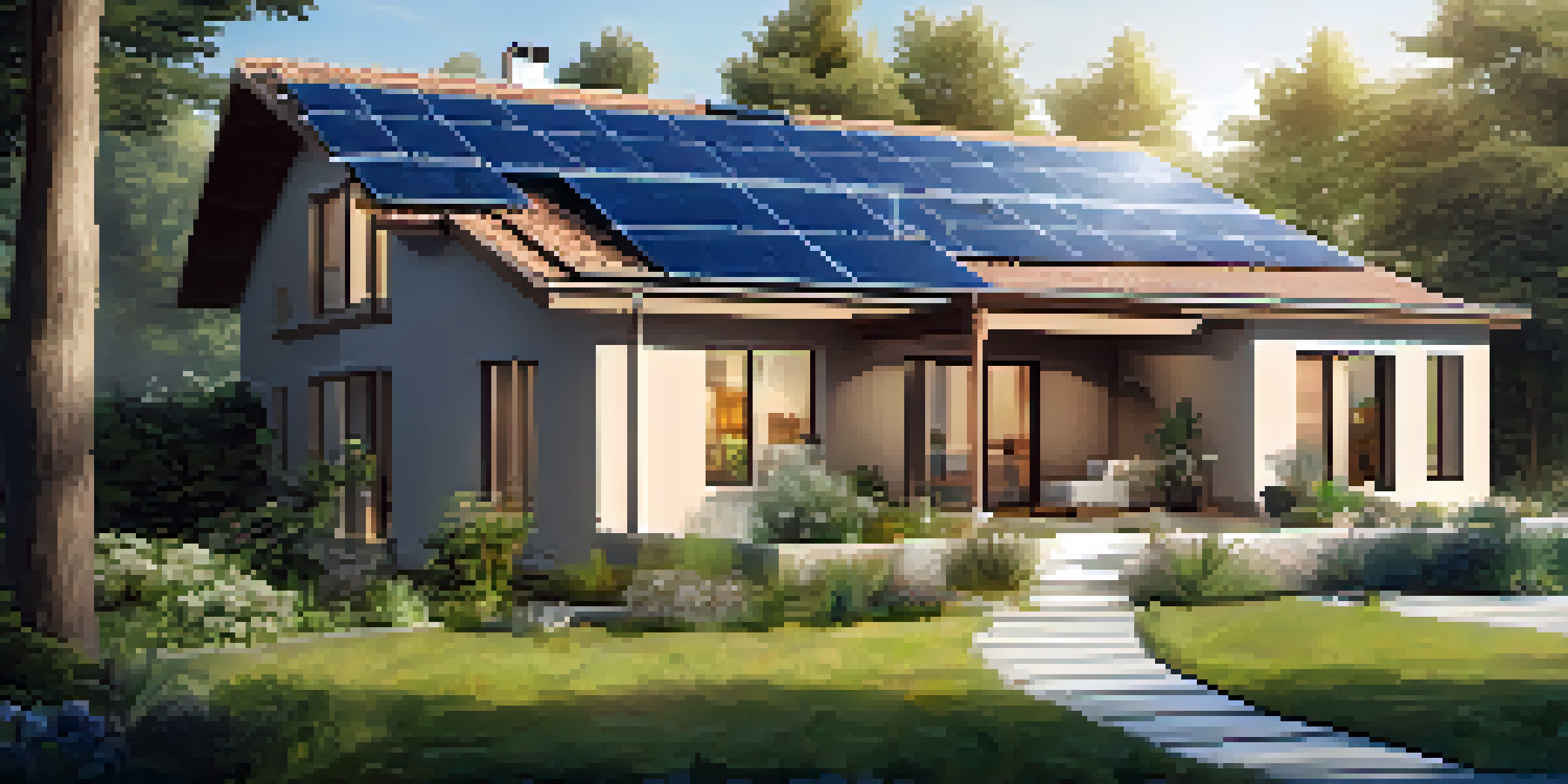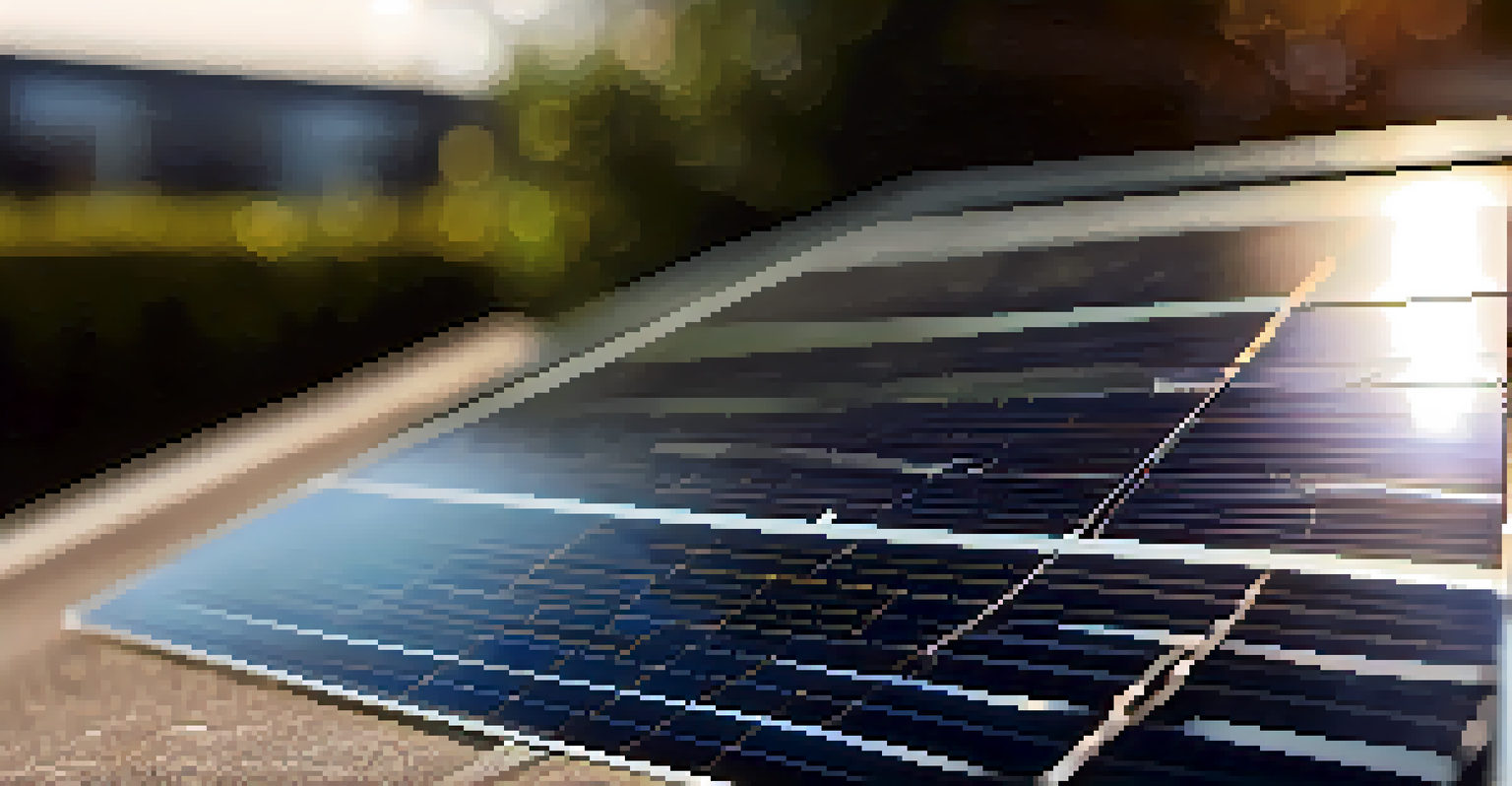Solar Panels: The Future of Sustainable Home Energy

Understanding Solar Panels and Their Functionality
Solar panels are devices that convert sunlight into electricity. They’re made up of many solar cells, typically using silicon, which capture sunlight and create a flow of electricity. This process is known as the photovoltaic effect, which is essentially how solar energy is harnessed and transformed into usable power.
The sun is the source of all energy. It is the ultimate renewable resource.
When sunlight hits the solar cells, it excites electrons, generating direct current (DC) electricity. This DC electricity is then converted into alternating current (AC) by an inverter, making it compatible with your home’s electrical system. This seamless conversion is what allows homeowners to power their appliances using sunlight.
Using solar panels means you can generate your electricity, reducing your reliance on the grid. Imagine your home running on energy generated from the very sun shining down on it—it’s not just a dream, but a growing reality for many!
The Environmental Impact of Solar Energy
One of the most compelling reasons to switch to solar energy is its positive impact on the environment. Unlike fossil fuels, solar energy is clean and renewable, reducing greenhouse gas emissions and air pollutants. This shift not only benefits individual households but also contributes to a healthier planet.

By utilizing solar panels, you are directly participating in the fight against climate change. Each kilowatt-hour of solar energy produced reduces the need for energy generated from non-renewable sources, which often involve harmful extraction and emissions. It’s like planting a tree—every little bit helps!
Solar Energy is Environmentally Friendly
Switching to solar energy reduces greenhouse gas emissions and helps combat climate change.
Moreover, the more homes that adopt solar energy, the greater the overall reduction in carbon footprints across communities. It’s a collective effort towards a sustainable future, and every home that goes solar is a step in the right direction.
Financial Benefits of Installing Solar Panels
While the initial investment for solar panels might seem daunting, the long-term financial benefits can outweigh the costs. Many homeowners find that their electricity bills decrease significantly after installation, sometimes even to zero. This not only helps in saving money but can also increase the value of your home.
The future will be powered by the sun, by the wind, and by the waves.
In addition to lower energy bills, many governments offer tax incentives, rebates, and financing options to encourage solar adoption. These financial aids can significantly reduce the upfront costs, making solar energy more accessible than ever. It’s like receiving a bonus for being environmentally responsible!
Furthermore, as energy prices continue to rise, having solar panels can protect you from fluctuating costs, providing peace of mind in your budget planning. It’s a smart investment for your future, both financially and environmentally.
The Technological Advancements in Solar Panel Systems
Technology in the solar energy sector is continuously evolving, leading to more efficient and affordable solar panels. Innovations such as bifacial panels, which capture sunlight from both sides, and solar shingles that blend seamlessly into roofs, are making solar energy more practical and aesthetically pleasing.
In addition, advancements in battery storage technology are allowing homeowners to store excess energy generated during sunny days for use at night. This means you can power your home with solar energy even when the sun isn’t shining—imagine the convenience and energy independence!
Long-Term Savings with Solar Panels
Despite initial costs, solar panels can significantly lower electricity bills and increase home value.
These technological improvements not only enhance efficiency but also expand the possibilities for solar energy in various settings, from residential homes to larger commercial installations. As these technologies become more mainstream, the future of solar energy looks brighter than ever.
Common Misconceptions About Solar Panels
Despite the benefits, several misconceptions about solar panels still exist, which can deter potential users. One common belief is that solar panels only work in sunny climates. In reality, solar panels can still generate electricity on cloudy days and even during winter months, although with reduced efficiency.
Another misconception is that solar panels require a lot of maintenance. In truth, solar systems are quite low-maintenance, often requiring just a periodic cleaning and a check-up every few years. This ease of upkeep makes them a hassle-free choice for many homeowners.
By addressing these myths, it becomes clear that solar energy is a viable option for almost anyone, regardless of location or lifestyle. Knowledge is power, and understanding the realities of solar energy can empower you to make informed decisions.
The Role of Government and Policy in Solar Energy Growth
Government policies play a crucial role in the growth of solar energy adoption. Many countries offer incentives such as tax credits, grants, and feed-in tariffs to promote the use of renewable energy. These policies can make a significant difference in the affordability of solar installations for homeowners.
Additionally, some local governments have implemented regulations to support solar development, such as streamlined permitting processes. This makes it easier for homeowners to install solar panels without juggling through bureaucratic red tape. It’s a win-win for both the environment and your wallet!
Government Incentives Boost Solar Adoption
Policies like tax credits and grants make solar installations more affordable for homeowners.
As public awareness of climate change grows, more citizens advocate for renewable energy policies, creating a positive feedback loop that encourages further investment in solar technology. Strong policy support is essential for building a sustainable future powered by clean energy.
The Future of Solar Energy in Residential Homes
Looking ahead, the future of solar energy in residential homes is promising. With ongoing advancements in technology, we can expect solar panels to become even more efficient and affordable. This trend will likely encourage more homeowners to consider solar energy as a viable option for their energy needs.
Moreover, as energy independence becomes increasingly important, the demand for solar solutions will rise. Homeowners are recognizing the value of generating their electricity and reducing their reliance on traditional energy sources. The shift toward sustainability is becoming a key factor in homeownership decisions.

Ultimately, the future of solar energy is not just a trend, but a movement towards a cleaner, more sustainable way of living. By embracing solar energy today, homeowners are paving the way for a brighter tomorrow for generations to come.